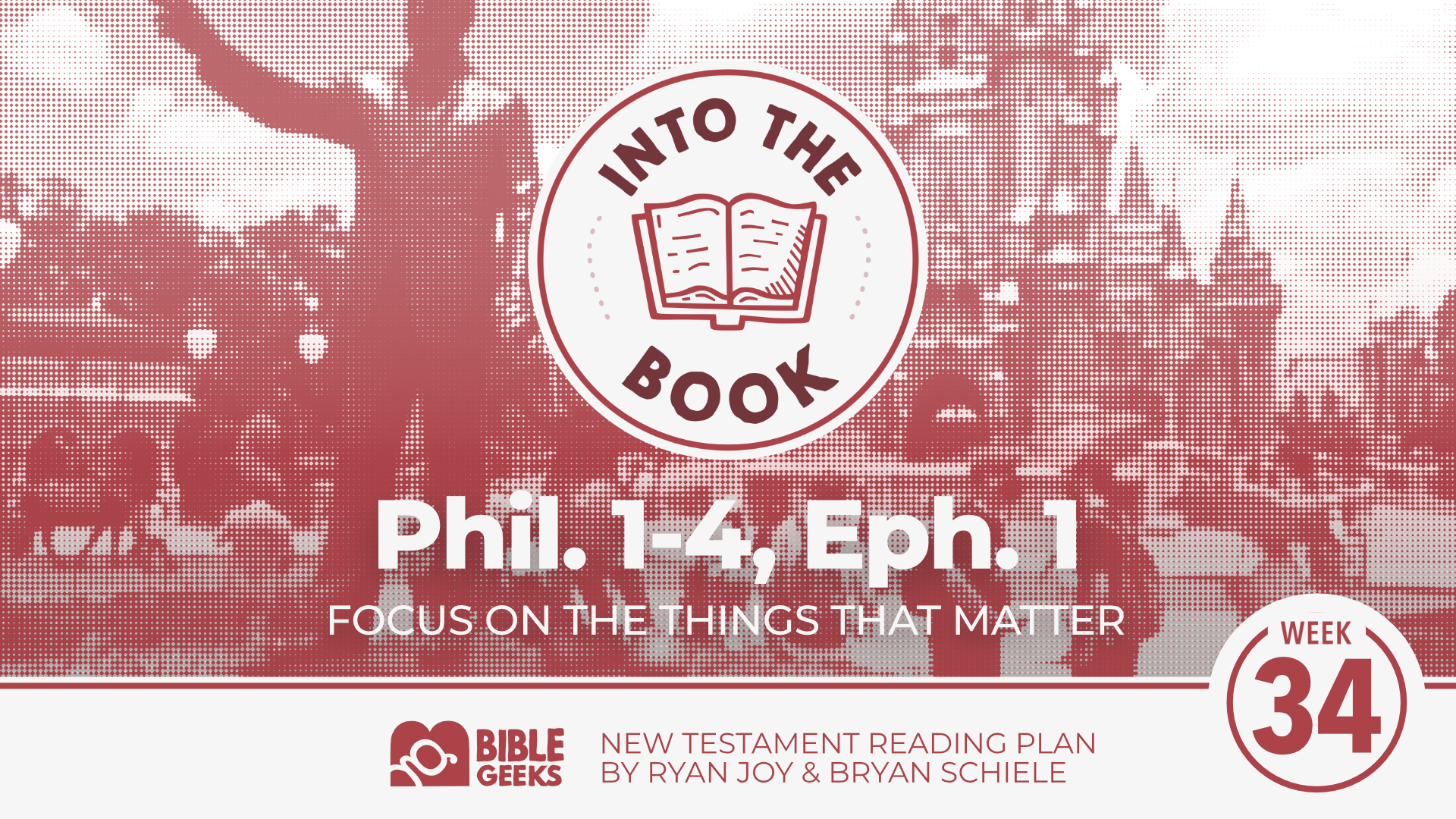
Phil. 1-4, Eph. 1; Ezek. 44-48, Hos. 1-10; Psalm 100-102
Phil. 1-4, Eph. 1
FROM THE NEW TESTAMENT
Focus on the Things That Matter
When Disney wanted to learn what captured children's attention at their theme parks, they hired Kare Anderson and a cultural anthropologist to study DisneyWorld's guests. Do kids focus on Mickey and his friends? Or maybe the sweets and rides? No, as Anderson wrote in the Harvard Business Review, "Instead it was their parents' cell phones, especially when the parents were using them. Those kids clearly understood what held their parents' attention — and they wanted it too." She says, "we often fail to realize how what we focus on comes to control our thoughts, our actions, and indeed, our very lives. Whatever we focus upon actually wires our neurons." 1
This week, we'll see that the key to joyful maturity in Christ is our focus. Reading Philippians and Ephesians, it's clear that whatever has your attention determines your attitude about circumstances and people. So, where should we place our focus?
Focus on the Gospel
On Monday (Php. 1), as Paul writes from prison, he shows a surprisingly positive outlook on his situation. Not that he likes imprisonment, but he sees progress where it matters most: in the spread of the gospel (Php. 1:12-18). As he sees it, living "means fruitful labor" (Php. 1:22) and dying is even better (Php. 1:23)!
- How would your perspective change if you viewed everything as an opportunity for bringing people to Christ?
Focus on Others
On Tuesday (Php. 2), Paul challenges us to look beyond our interests and prioritize others (Php. 2:3-4). We must learn from Christ, who emptied himself for us (Php. 2:6-8). We can also learn from the selfless example of Paul (Php. 2:17), Timothy (Php. 2:20-21), and Epaphroditus (Php. 2:25-30).
- How far should we take the command to "count others more significant than yourselves" (Php. 2:3)?
Focus on the Goal
Wednesday's reading (Php. 3) begins with Paul stacking up his credentials (Php. 2:4-6) against the Judaizing false teachers' (Php. 3:2-4). It's easy to get stuck in past achievements and failures, but Paul shows us how to get beyond our past. How? By looking forward to our resurrection (Php. 3:10), like a runner looks to the finish line (Php. 3:12-14).
"But our citizenship is in heaven, and from it we await a Savior, the Lord Jesus Christ, who will transform our lowly body to be like his glorious body …" (Php. 3:20-21).
- Have you fixed your attention on that great day?
Focus on the Lord
On Thursday (Php. 4), we find some of Paul's most famous and inspiring words, encouraging us to fix our hearts on God. He says to "rejoice in the Lord always" (Php. 4:4), to "not be anxious about anything" (Php. 4:6), and to think noble thoughts (Php. 4:8). He promises that God's peace "which surpasses all understanding" will guard our hearts (Php 4:7), and we "can do all things" through Christ (Php. 4:13).
- Why do you think joy and peace accompany those who wholeheartedly follow these instructions?
Focus on Your Blessings
On Friday, we start the book of Ephesians, Paul's explanation of God's grand, eternal purposes. He praises God who has "blessed us in Christ with every spiritual blessing in the heavenly places" (Eph. 1:3). Then he lists many of our spiritual blessings, like our adoption (Eph. 1:5), redemption (Eph. 1:7), and inheritance (Eph. 1:11). Then he fittingly moves from praise to express his thanksgiving and prayer for the Ephesian disciples (Eph. 1:15ff).
- How often do you reflect on your spiritual blessings in Christ?
- What effect does gratitude have on your perspective of your life?
[What Captures Your Attention Controls Your Life by Kare Anderson](https://hbr.org/2012/06/what-captures-your-attention-c) ↩

Ezek. 44-48, Hos. 1-10
FROM THE OLD TESTAMENT
Ezekiel chapters 44-48 describe the vision of a restored temple and the renewed worship practices for Israel. These chapters emphasize the glory of God returning to the temple, signifying a restoration of divine presence among His people. The envisioned temple reflects a renewed covenant relationship, where the priests and Levites are called to purity and faithfulness in worship. Ezekiel outlines specific regulations and the allocation of land, emphasizing the significance of holiness and communal identity in worship. This vision points toward a future where God's sanctuary is central to Israel's life, highlighting themes of hope and renewal. Together with the messages in Hosea, Ezekiel portrays a profound narrative of judgment, faithfulness, and redemption, affirming God's relentless commitment to His people and their eventual restoration.
REFLECTING ON THE PSALMS
Psalms 100-102 transition from a celebration of God's sovereignty to a heartfelt expression of gratitude, worship, and lament. Psalm 100 is a call to worship, urging all the earth to enter God's presence with joy and thanksgiving, acknowledging Him as the Creator. It emphasizes His everlasting faithfulness and the joy found in being part of His people. In contrast, Psalms 101 and 102 convey the struggles of an individual seeking God amidst personal anguish and societal injustice. Psalm 101 outlines the psalmist's commitment to living righteously and leading a life of integrity. Meanwhile, Psalm 102 is a moving plea for God's mercy, reflecting the deep affliction and longing for restoration. Together, these psalms highlight a balance between communal worship and personal supplication, illustrating how faith can thrive even in times of distress.


